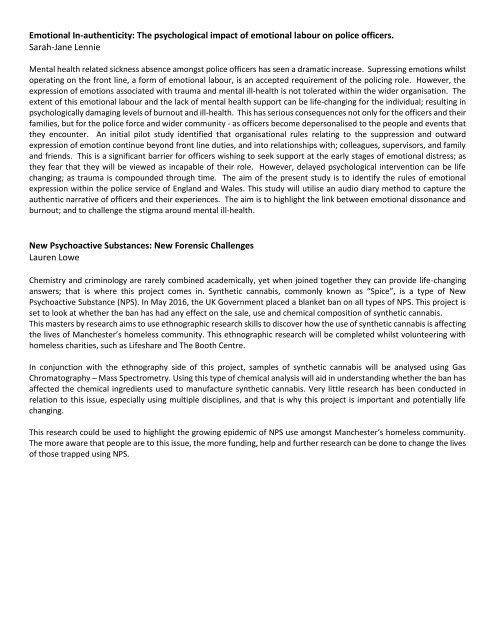Conference Programme FULL (1)
You also want an ePaper? Increase the reach of your titles
YUMPU automatically turns print PDFs into web optimized ePapers that Google loves.
Emotional In-authenticity: The psychological impact of emotional labour on police officers.<br />
Sarah-Jane Lennie<br />
Mental health related sickness absence amongst police officers has seen a dramatic increase. Supressing emotions whilst<br />
operating on the front line, a form of emotional labour, is an accepted requirement of the policing role. However, the<br />
expression of emotions associated with trauma and mental ill-health is not tolerated within the wider organisation. The<br />
extent of this emotional labour and the lack of mental health support can be life-changing for the individual; resulting in<br />
psychologically damaging levels of burnout and ill-health. This has serious consequences not only for the officers and their<br />
families, but for the police force and wider community - as officers become depersonalised to the people and events that<br />
they encounter. An initial pilot study identified that organisational rules relating to the suppression and outward<br />
expression of emotion continue beyond front line duties, and into relationships with; colleagues, supervisors, and family<br />
and friends. This is a significant barrier for officers wishing to seek support at the early stages of emotional distress; as<br />
they fear that they will be viewed as incapable of their role. However, delayed psychological intervention can be life<br />
changing; as trauma is compounded through time. The aim of the present study is to identify the rules of emotional<br />
expression within the police service of England and Wales. This study will utilise an audio diary method to capture the<br />
authentic narrative of officers and their experiences. The aim is to highlight the link between emotional dissonance and<br />
burnout; and to challenge the stigma around mental ill-health.<br />
New Psychoactive Substances: New Forensic Challenges<br />
Lauren Lowe<br />
Chemistry and criminology are rarely combined academically, yet when joined together they can provide life-changing<br />
answers; that is where this project comes in. Synthetic cannabis, commonly known as “Spice”, is a type of New<br />
Psychoactive Substance (NPS). In May 2016, the UK Government placed a blanket ban on all types of NPS. This project is<br />
set to look at whether the ban has had any effect on the sale, use and chemical composition of synthetic cannabis.<br />
This masters by research aims to use ethnographic research skills to discover how the use of synthetic cannabis is affecting<br />
the lives of Manchester’s homeless community. This ethnographic research will be completed whilst volunteering with<br />
homeless charities, such as Lifeshare and The Booth Centre.<br />
In conjunction with the ethnography side of this project, samples of synthetic cannabis will be analysed using Gas<br />
Chromatography – Mass Spectrometry. Using this type of chemical analysis will aid in understanding whether the ban has<br />
affected the chemical ingredients used to manufacture synthetic cannabis. Very little research has been conducted in<br />
relation to this issue, especially using multiple disciplines, and that is why this project is important and potentially life<br />
changing.<br />
This research could be used to highlight the growing epidemic of NPS use amongst Manchester’s homeless community.<br />
The more aware that people are to this issue, the more funding, help and further research can be done to change the lives<br />
of those trapped using NPS.


